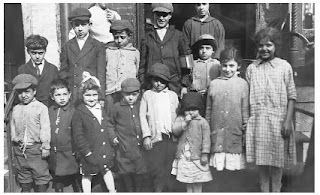The Spirit of 1776
“The man who is right is a majority. He who has God and conscience
on his side, has a majority against the universe.” ― Frederick Douglass
The revolutionary war fought from 1775-1783 was not simply a
war to end British tyranny and unjust taxation. It was a war for freedom of
conscience—freedom to make choices and face the outcomes of those choices both
good and bad. In fact, a republic cannot stand without freedom of conscience.
It can withstand taxation, it can even endure some level of tyranny, but without the
freedom to choose and believe? No. It ceases to exist entirely.
The basic fundamental function of each individual in a
republic is the function of making decisions. The freedom to choose is a
deeply American concept rooted in the spirit of 1776. In fact, without the
ability to choose, without the value of free will, each individual loses
his/her ability to activate conscience—to act in accordance with what is good,
pure, virtuous, and right. To act counter to these values is to go against the purpose of conscience. It is the most visible sign that man has contaminated his own soul --perhaps to the point of even killing it in order for his vices to override his virtues. And while man (and woman) has the ability to choose vice over virtue, in commanding their own freedom, their choices also have consequences. To avoid those consequences or make them obsolete is to encourage vice and death. This actually runs counter to a republic in every sense of the word. A republic cannot thrive without goodness and integrity--without God and just law.
While freedom of conscience is often credited to the
Enlightenment, most notably French theorist Francois Marie D’Arouet, aka,
Voltaire, it is actually the Bible that teaches the importance of free will.
Scriptural references consistently tell the stories of people making personal
decisions and living the impact of the consequences of those decisions. For
example, Cain's murdering his brother Abel, led him to a cursed life of
wandering and toiling on earth. Mary's decision to abide by the request of the Angel Gabriel to birth a savior to the world was another case showing the impact of individual decision-making. The Bible is full of such examples.
Conscience is pivotal to understanding 1776. The Declaration
of Independence and the Bill of Rights adopted by many colonial-later-turned-state
constitutions enabled citizens to make conscious decisions that would not only
affect themselves and their families, but the wider public as well. The
doctrine of free conscience in North America derives from Roger Williams,
founder of Rhode Island who once said, “Civil peace cannot stand entire, where
religion is corrupted (2 Chron. 15. 3. 5. 6; and Judges 8)” (Bloody Tenent). To
Williams and the subsequent founders of America, religion and faith was the
means to freedom—it was the conduit to a free life rooted in God’s laws over
man’s corrupt ones. Though Williams was against an ‘infinite liberty of
conscience’ whereby men may become incorrigible, recidivous, unreformable, he
did, however, believe in the supremacy of spiritual virtue. It was the responsibility
of each individual to hone his/her relationship to God and if he/she did not,
government’s influence would fill the spiritual void—rendering conscience
useless and government supreme.
The founders of the nation knew that a useless conscience
was a danger to the republic and to the individuals that make up society. Thomas
Jefferson in his Notes on the State of Virginia stated, “Our
rulers can have no authority over such natural rights only as we have submitted
to them. The rights of conscience we never submitted—we could not submit. We
are answerable for them to our God.” (Notes on the State of Virginia,
Query XVII: The Different Religions Received In the State, 1781) Once people
can no longer think on their own, once government takes the place of God,
freedom loses its effect. Instead, a pseudo freedom emerges—one that gives
people comfort and enables one to believe the existence of happiness through
government security, muzzled debate, and conformist thinking. The result of
pseudo-freedom you ask? The death of creativity, innovation, truth, and
meaning. Individual purpose is no longer important in society, rather,
conformity, fear, and security prevail. What one believes to be his/her
purpose, is actually fed to him/her through media indoctrination, a biased
education, and a God-less community of god-like impersonators.
Jefferson was perhaps most cautious to keep freedom of
choice a primary tenet of the republic, perhaps almost to a fault. In his
Notes, he discusses the importance of not silencing free speech or conscience,
but encouraging multiple perspectives. To Jefferson, liberty of conscience
would render the truth into existence, while falsehoods would naturally
dissipate. There was no need to get violent, to silence opposition, or create falsehoods to change public sentiments. He writes, “Reason and free inquiry are the only effectual agents against
error. Give a loose rein to them, they will support the true religion by
bringing every false one to their tribunal, to the test of their investigation.
They are the natural enemies of error, and of error only . . . .” (Notes
on the State of Virginia, Query XVII: The Different Religions Received In the
State, 1781)
Frederick Douglass, the former slave turned prominent spokesman
for freedom and abolition, knew the dangers of suppressing liberty of
conscience. He once spoke to Boston’s Music Hall in 1860 after an event of suppression
of free speech took place. Abolitionists as Douglass and several others were
hindered from speaking publicly by anti-abolitionists. Douglass spoke thus, “Liberty
is meaningless where the right to utter one’s thoughts and opinions has ceased
to exist. That, of all rights, is the dread of tyrants. It is the right which they first of all
strike down. They know its power. Thrones, dominions, principalities, and
powers, founded in injustice and wrong, are sure to tremble, if men are allowed
to reason of righteousness, temperance, and of a judgement to come in their
presence. Slavery cannot tolerate free speech. Five years of its exercise would
banish the auction block and every chain in the South. They will have none of
it there, for they have the power.” (Douglass, “A Plea For Freedom of Speech In
Boston”)
In today’s America, it may become nearly impossible for the
Spirit of 1776 to live on. When God is no longer considered the ultimate
sovereign on Earth in society, when the pseudo-freedom of ‘anything goes’, and
a majority of people readily submit to a fallible government and ‘woke’ mob,
the liberty of conscience can become moot. When the individual can no longer
trust himself/herself to make the necessary decisions to protect themselves
from tyrannical abuse, he/she have handed over their liberty of conscience in
exchange for comfort and security. They have allowed pseudo-freedom to direct
their inner-being. When a substantial majority of people feel the need to silence those whom they disagree with, the first amendment is negated. The result is the death of the individual’s conscience, and
thus, the republic.
Works-Cited:
Douglass, Frederick. "A Plea For Freedom of Speech In Boston". The Patriot Post online. URL: Frederick Douglas: A Plea for Free Speech in Boston — The Patriot Post
Jefferson, Thomas. Notes on the State of Virginia. Documenting the American South online edition. URL: Thomas Jefferson, 1743-1826. Notes on the State of Virginia (unc.edu)
Williams, Roger. The Bloody Tenent of Persecution. The Reformed Reader online. URL: The Bloody Tenent of Persecution, Roger Williams | The Reformed Reader




Comments